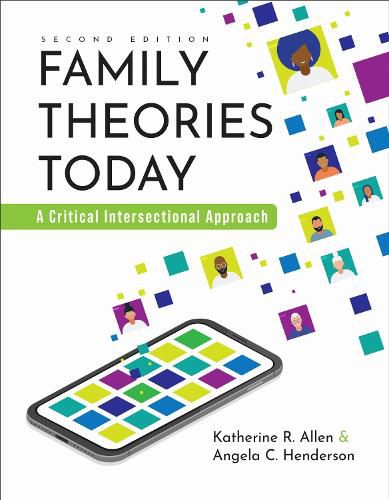Readings Newsletter
Become a Readings Member to make your shopping experience even easier.
Sign in or sign up for free!
You’re not far away from qualifying for FREE standard shipping within Australia
You’ve qualified for FREE standard shipping within Australia
The cart is loading…






This title is printed to order. This book may have been self-published. If so, we cannot guarantee the quality of the content. In the main most books will have gone through the editing process however some may not. We therefore suggest that you be aware of this before ordering this book. If in doubt check either the author or publisher’s details as we are unable to accept any returns unless they are faulty. Please contact us if you have any questions.
The new edition of Katherine R. Allen and Angela C. Henderson’s Family Theories Today: A Critical Intersectional Approach expands on the dynamic, creative, and scientific approach that made the first edition a success. The authors include all types of family structures, processes, and contexts, and their approach is informed by families as intimate settings for individual and relational development where both care and trauma occur. Full of examples grounded in real people’s lives, the book covers twelve theories-ranging from Functionalist to Social Exchange to Feminist to Family Stress and Resilience-in a highly accessible but comprehensive way. Each chapter covers the theory’s historic origins, major concepts, strengths and weaknesses, alternative perspectives, application to empirical research and practice, relevant pop culture examples, multimedia applications, discussion questions, suggestions for further reading, and more.
New highlights of this completely up-to-date and revised edition include two new chapters on topics that have gained increasing relevance: Critical Race Theory and Queer Theory; strengthened research and application about family diversity in each chapter; fresh multimedia suggestions; voices from lived experience; and more extensive outreach to a broader array of relevant disciplines.
This text is not only meant to be read but also to provoke both personal reflection and professional considerations for both family scientists in training and those in the human services in general.
$9.00 standard shipping within Australia
FREE standard shipping within Australia for orders over $100.00
Express & International shipping calculated at checkout
Stock availability can be subject to change without notice. We recommend calling the shop or contacting our online team to check availability of low stock items. Please see our Shopping Online page for more details.
This title is printed to order. This book may have been self-published. If so, we cannot guarantee the quality of the content. In the main most books will have gone through the editing process however some may not. We therefore suggest that you be aware of this before ordering this book. If in doubt check either the author or publisher’s details as we are unable to accept any returns unless they are faulty. Please contact us if you have any questions.
The new edition of Katherine R. Allen and Angela C. Henderson’s Family Theories Today: A Critical Intersectional Approach expands on the dynamic, creative, and scientific approach that made the first edition a success. The authors include all types of family structures, processes, and contexts, and their approach is informed by families as intimate settings for individual and relational development where both care and trauma occur. Full of examples grounded in real people’s lives, the book covers twelve theories-ranging from Functionalist to Social Exchange to Feminist to Family Stress and Resilience-in a highly accessible but comprehensive way. Each chapter covers the theory’s historic origins, major concepts, strengths and weaknesses, alternative perspectives, application to empirical research and practice, relevant pop culture examples, multimedia applications, discussion questions, suggestions for further reading, and more.
New highlights of this completely up-to-date and revised edition include two new chapters on topics that have gained increasing relevance: Critical Race Theory and Queer Theory; strengthened research and application about family diversity in each chapter; fresh multimedia suggestions; voices from lived experience; and more extensive outreach to a broader array of relevant disciplines.
This text is not only meant to be read but also to provoke both personal reflection and professional considerations for both family scientists in training and those in the human services in general.